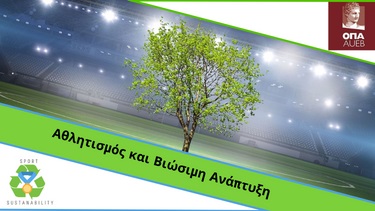- PROGRAMS
- Sports and Sustainable Development
Sports and Sustainable Development
The concept of Sustainable Development has gradually penetrated all business sectors. Multinational companies are publishing their carbon reduction strategies, while an increasing number of countries are demanding the publication of annual performance reports by large and medium-sized enterprises. The sports industry could not be an exception to this process, as major sporting events (Olympic Games, World Cups) have an extremely large carbon footprint. At the same time, the ability of sports to affect ideas through the emotional attachments of millions of people with sports clubs is recognized around the world, and international organizations such as the United Nations strive to use sport as a vehicle to battle Climate Change.
With incentives ranging from fan demands to attracting investment, sports companies are taking action to reduce the carbon emissions associated with their operations as well as their Sustainable Development. However, the specific characteristics of sports organizations make the implementation of sustainability programs difficult.
This course aims to introduce participants to the implementation of Sustainable Development programs in sports organizations. Specifically, participants will become familiar with the implementation of strategies to reduce the environmental footprint of sports organizations as well as the importance of social and financial sustainability programs and strategies.
At the same time, sections on communication and marketing of environmental practices as well as attracting sponsorships through Sustainable Development will be presented.
- Understand and address concepts in the context of sustainability.
- Critically evaluate environmental practices in sport.
- Create and propose sustainable strategies to sports organizations.
- Understand the benefits of sustainable practices in sport.
The participant will acquire theoretical and practical knowledge on the implementation of the Sustainable Development Goals in sports and through sports. At the end of the course, they will be able to create sustainability strategies as well as reports for sports organizations, provide consulting services to them, create marketing strategies for sustainable practices and measure the environmental and social impact of sports events.
At the same time, the participant will be able to understand which are the incentives of organizations for turning to sustainable development. Furthermore, they will be able to present case studies that will highlight the economic and other benefits of sustainability (Business Case of sustainability). Finally, they will be able to recognize when sustainability actions are meaningful and when they are implemented for marketing purposes only (greenwashing).
- Slides with the material of each unit. In each section the slides will cover the material, and will contain examples of applications.
- Case Studies
- Bibliography, with material available online.
- Quizzes that will concern the study of the unit that will be taught
- Projects with real case development tasks.
- Short videos with a summary of the material per section.
Includes training hours (indicative) using an asynchronous distance learning (eLearning) platform.
Additional hours of work are included (indicative) and may include individual study, writing assignments, participation in field visits, participation in exams, etc.
The total hours include hours of synchronous and asynchronous training, as well as additional hours of employment.
Weeks in which activities of any kind are planned are included.
- Active students or graduates of economics, management, statistics or other related departments who want to delve into the field of sustainable development in the field of sports.
- Active students or graduates of marketing and communication departments who are interested in indulging in promoting sustainable development with modern marketing strategies.
- Active sports management students or graduates who wish to familiarize themselves with concepts that will occupy them during their career
- Active students or graduates of Physical Education and Physical Education departments who are interested in sustainable development and its various aspects of implementation
- Active students or graduates of business administration who wish to become familiar with the concepts of sustainability in order to be able to apply them during their career
- Professionals who, in their daily work, need to deal with sustainable development concepts
- Researchers from various disciplines who need, for their research, to delve into the field of sustainable development
- Scientists with basic knowledge in the field of sustainable development who want to extent their knowledge to more advanced methods.
- Researchers who wish to learn modern methods and global trends around sustainable development in the field of sports.
CONTACT
45, Kefallinias Str., 11257, Athens
-
dummy secretariat@diaviou.aueb.gr
-
dummy+30 210 8203 913
For the in Class programs:
-
dummydiazosis@diaviou.aueb.gr
-
dummy+30 210 8203 916, 912, 914
For the eLearning Programs:
-
dummyelearning@diaviou.aueb.gr
-
dummy+30 210 8203 753





